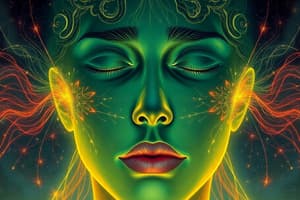Podcast
Questions and Answers
Which level of arousal tends to lead to optimal performance for difficult tasks?
Which level of arousal tends to lead to optimal performance for difficult tasks?
- High arousal
- Moderate arousal
- Low arousal (correct)
- Very low arousal
What is the primary issue with using a polygraph to detect lies?
What is the primary issue with using a polygraph to detect lies?
- It has a high level of accuracy.
- It only measures blood pressure.
- It can be easily manipulated.
- Physiological responses can be influenced by emotions other than deception. (correct)
What do display rules dictate?
What do display rules dictate?
- The physiological responses during emotional moments
- The frequency of emotional expression
- How, when, and where emotions should be expressed (correct)
- The content of emotional experiences
In Maslow's hierarchy of needs, which need must be fulfilled last?
In Maslow's hierarchy of needs, which need must be fulfilled last?
What is the function of the ventromedial hypothalamus?
What is the function of the ventromedial hypothalamus?
Which of the following best describes unconscious motivation?
Which of the following best describes unconscious motivation?
How can extrinsic motivation negatively affect intrinsic motivation?
How can extrinsic motivation negatively affect intrinsic motivation?
What role do hormones like ghrelin and leptin play in hunger regulation?
What role do hormones like ghrelin and leptin play in hunger regulation?
What is a characteristic of Binge Eating Disorder (BED)?
What is a characteristic of Binge Eating Disorder (BED)?
According to the hedonic principle, what primarily motivates human behavior?
According to the hedonic principle, what primarily motivates human behavior?
What are the two dimensions that define emotional experiences?
What are the two dimensions that define emotional experiences?
How does the Cannon-Bard theory differ from the James-Lange theory of emotion?
How does the Cannon-Bard theory differ from the James-Lange theory of emotion?
According to the two-factor theory of emotion, what role does arousal play?
According to the two-factor theory of emotion, what role does arousal play?
What kind of physiological responses are expected in the James-Lange theory?
What kind of physiological responses are expected in the James-Lange theory?
What is an implication of the two-factor theory's claim about arousal?
What is an implication of the two-factor theory's claim about arousal?
What part of the nervous system is primarily responsible for arousal?
What part of the nervous system is primarily responsible for arousal?
What is a primary critique of the two-factor theory by modern research?
What is a primary critique of the two-factor theory by modern research?
What does the concept of action tendencies refer to in the context of emotions?
What does the concept of action tendencies refer to in the context of emotions?
How does the best level of arousal for performance change with task difficulty?
How does the best level of arousal for performance change with task difficulty?
Which statement reflects a limitation of the James-Lange theory?
Which statement reflects a limitation of the James-Lange theory?
Flashcards
Two dimensions of emotion
Two dimensions of emotion
Valence (how positive a feeling is) and arousal (how energetic a feeling is).
James-Lange theory
James-Lange theory
Emotions are the perception of our body's physiological responses to a stimulus. Our feelings are the result of our body's reactions.
Cannon-Bard theory
Cannon-Bard theory
Emotions and bodily arousal happen simultaneously but independently. Our feelings and physical responses come at the same time but are not directly related.
Two-factor theory
Two-factor theory
Signup and view all the flashcards
Appraisal
Appraisal
Signup and view all the flashcards
Action tendencies
Action tendencies
Signup and view all the flashcards
Sympathetic Nervous System
Sympathetic Nervous System
Signup and view all the flashcards
Optimal arousal
Optimal arousal
Signup and view all the flashcards
Task difficulty and arousal
Task difficulty and arousal
Signup and view all the flashcards
Valence
Valence
Signup and view all the flashcards
Yerkes-Dodson Law
Yerkes-Dodson Law
Signup and view all the flashcards
Polygraph
Polygraph
Signup and view all the flashcards
Emotional Expression
Emotional Expression
Signup and view all the flashcards
Display Rules
Display Rules
Signup and view all the flashcards
Facial Feedback Effect
Facial Feedback Effect
Signup and view all the flashcards
Motivation
Motivation
Signup and view all the flashcards
Maslow's Hierarchy of Needs
Maslow's Hierarchy of Needs
Signup and view all the flashcards
Self-actualization
Self-actualization
Signup and view all the flashcards
Obesity
Obesity
Signup and view all the flashcards
Intrinsic Motivation
Intrinsic Motivation
Signup and view all the flashcards
Study Notes
Emotion
- Two Dimensions of Emotion: Valence (positivity) and Arousal (energy).
- Appraisal: Evaluations of stimuli/events that influence emotions.
- Action Tendencies: Readiness for specific behaviors related to emotions.
Theories of Emotion
- James-Lange Theory: Emotions are a result of perceiving physiological responses to a stimulus.
- Cannon-Bard Theory: Emotions and bodily arousal occur simultaneously and independently.
- Two-Factor Theory (Schachter/Singer): Physiological arousal is interpreted differently based on context to determine specific emotion.
Arousal and Performance
- Sympathetic Nervous System: Involved in arousal, triggering the fight-or-flight response.
- Yerkes-Dodson Law: Optimal performance occurs at a moderate level of arousal.
- Simple tasks: Higher arousal can be beneficial.
- Difficult tasks: Lower arousal is better.
Polygraph
- A device measuring physiological responses believed to be related to lying.
- Measures: Heart rate, blood pressure, respiration, skin conductivity.
- Problem: Physiological responses can be due to anxiety/nervousness, not just deception.
Emotional Expression
- Emotional Expression: Observable signs of emotion (facial expressions, tone of voice, body language).
- Facial Expressions: Most powerful nonverbal way to communicate emotion; capable of thousands of unique expressions.
- Display Rules: Social/cultural norms dictating when/how emotions are expressed.
Motivation
- Motivation: Internal drives for purposeful behavior.
- Instinct: Innate tendency to seek a goal.
- Approach Motivation: Drive toward positive outcomes/rewards.
- Avoidance Motivation: Drive to avoid negative outcomes (often stronger).
- Drive-Reduction Theory: Motivation to reduce internal drives (hunger, thirst) to maintain balance.
- Hedonic Principle: Seeking pleasure and avoiding pain.
Maslow's Hierarchy of Needs
- Prioritizes basic needs before higher-level needs.
- Physiological: Food, water, sleep.
- Safety: Security, stability.
- Social: Belongingness, love.
- Esteem: Respect, self-esteem.
- Self-Actualization: Achieving full potential (intellectual fulfillment).
Hunger
- Body's energy needs drive hunger.
- Hypothalamus: Regulates appetite.
- Lateral hypothalamus: Activates hunger.
- Ventromedial hypothalamus: Suppresses hunger.
- Hormones (ghrelin, leptin): Regulate hunger.
- Psychological and cultural factors also influence hunger.
Eating Disorders
- Binge Eating Disorder: Uncontrolled eating episodes.
- Bulimia Nervosa: Binge eating followed by compensatory behaviors.
- Anorexia Nervosa: Severe food restriction.
- Obesity: Defined by BMI of 30 or greater; linked with health risks.
Sexual Motivation
- Hormones (testosterone, estrogen) play roles.
Achievement Motivation
- Drive to excel, achieve goals, overcome challenges.
Motivation Types
- Intrinsic Motivation: Internal rewards drive actions (personal satisfaction).
- Extrinsic Motivation: External rewards drive actions (money, recognition).
- Extrinsic motivation can sometimes hinder intrinsic motivation.
Terror Management Theory
- Motivation to reduce fear of death by upholding cultural beliefs/pursuing self-esteem.
Studying That Suits You
Use AI to generate personalized quizzes and flashcards to suit your learning preferences.




